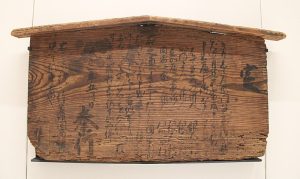Thomas Peace
The Portuguese arrived in Japan in 1543, laying claim to the islands under the Treaty of Tordesillas. Japan was in the middle of a civil war that had lasted for nearly a century. Contemporary to the arrival of the Portuguese, the country began to come back together under the “three unifiers”: Oda Nobunaga (1534-1583), Toyotomi Hideyoshi (1536-15989), and Tokugawa Ieyasu (1543-1616). Important to this was the arrival of the arquebus, a early musket, which Nobunaga and the two unifiers who followed used to help consolidate their power.
With the Portuguese came dozens of priests. Disputed by Spain, priests, mostly Jesuits, but also Franciscans, and Dominicans began to evangelize throughout the country, leading to thousands of conversions. In Europe, religious turmoil reigned following the Protestant Reformation. In response, a new wave of Catholic evangelism emerged to respond to the church’s declining influence. Out of this renewed focus emerged the Jesuits (also known as the Society of Jesus) in 1539. A decade later, Francis Xavier, one of the order’s founders arrived in Japan.
The Jesuit strategy was to achieve their religious goals through the elite. One of the most receptive to their entreaties was Omura Sumitaga who, in 1569, allowed a port to be established at Nagasaki, and began a campaign against Buddhists. Amidst the instability of war, the Jesuits were able to secure administration of the growing city. But, when Toyotomi Hideyoshi arrived in the region (Kyushu province) he found the faith – which had expanded across Japan – an obstacle to unification, issuing the edicts that serve as this week’s module.
As you read through these edicts, consider the following questions:
- What do the edicts tell us about Hideyoshi’s approach to unifying Japan?
- What is the relationship between Christianity and trade?
- What is the place of Buddhism in these edicts?

Translation of noticeboard: “Regulation. Christianity has been banned for many years. Of course, if someone appears suspicious, you must report them. Rewards given as follows: For handing over a priest – 500 pieces of silver. For handing over a brother (monk) – 300 pieces of silver. For handing over someone who has returned to the (Christian) faith – 100 pieces of silver. For handing over someone who shelters Christians, or an ordinary believer – 100 pieces of silver. For reporting someone who shelters Christians, or an ordinary believer, you might bepaid (up to) 500 pieces of silver, depending on the person’s importance. If a Christian emerges from hiding or some other place, then the headman and the five-man committee of that place may also be treated as criminal. Know ye well: By the Magistrate, 1st day, 5th month, Tenna 2 (1682), it is hereby ordered and must be strictly observed in this territory.” (British Museum)
This module was last updated in December 2021.
